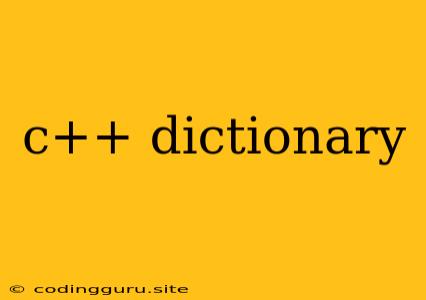Unlocking the Power of Dictionaries in C++
C++ is a powerful and versatile programming language that can be used to create a wide range of applications. One of the key elements in C++ development is the use of data structures, and dictionaries are among the most essential. But what exactly is a C++ dictionary and how can you leverage its power in your projects?
What is a C++ Dictionary?
In simple terms, a C++ dictionary is a data structure that allows you to store and retrieve data using key-value pairs. Think of it as a real-life dictionary where you look up a word (the key) to find its definition (the value).
Why Use Dictionaries in C++?
Dictionaries offer several advantages that make them incredibly useful in C++ programming:
-
Efficient Data Retrieval: Dictionaries allow you to access data very quickly using keys. This is especially beneficial when dealing with large datasets where you need to find specific information efficiently.
-
Flexibility and Organization: You can store different types of data as values, making dictionaries adaptable to diverse requirements. You can organize data logically based on meaningful keys.
-
Dynamic Size: C++ dictionaries are dynamic, meaning they can grow or shrink as needed, allowing you to easily add or remove data without worrying about fixed memory allocations.
Types of C++ Dictionaries
While there isn't a built-in dictionary data structure in C++, you can achieve dictionary functionality using different approaches:
1. Standard Template Library (STL) Maps:
std::mapis a powerful container provided by the STL. It implements a dictionary using a balanced binary search tree. This structure ensures efficient search, insertion, and deletion operations.
2. Unordered Maps:
std::unordered_mapuses a hash table to store key-value pairs. This offers potential for faster access compared tostd::mapin certain scenarios.
3. Custom Dictionaries:
- You can build your own dictionary structure using different techniques like hash tables or binary search trees. This gives you more control over implementation details but requires more effort.
Example: Creating and Using a Dictionary in C++
Let's demonstrate how to use a C++ dictionary (specifically an std::map) in practice:
#include
#include Key Considerations for Using Dictionaries in C++
-
Key Type: The key type must support ordering for
std::mapor hashing forstd::unordered_map. -
Value Type: The value type can be any data type, allowing you to store different types of information.
-
Efficiency:
std::mapoffers guaranteed logarithmic time for most operations, whilestd::unordered_mapcan provide potentially faster average performance. -
Memory Usage: Both
std::mapandstd::unordered_maphave their memory implications. Consider the size of your data and the memory constraints of your application.
Conclusion
C++ dictionaries, implemented using containers like std::map or std::unordered_map, are powerful tools for efficient data storage and retrieval in your C++ projects. By understanding how to use them effectively, you can enhance the organization and functionality of your applications, leading to cleaner and more efficient code. Whether you are working with student records, inventory management, or any other data-intensive task, C++ dictionaries provide a valuable solution for organizing and accessing information in a structured and intuitive way.
